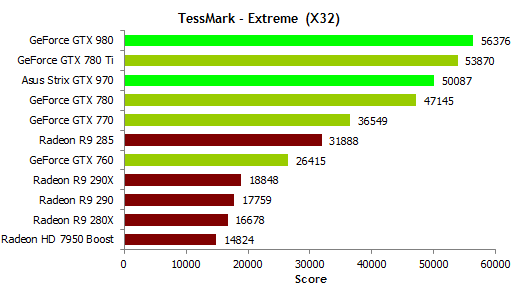Many people on this thread are gonna blow off what you are saying but there is a clear pattern. I really dont think many people have the guts to say what you have for fear of the push back.
I have seen enough lately that makes me wonder. It seems that part of AMDs plan could be to twist Nvidia advantages into something bad, evil, or awful. I dont want to get too far off topic and i will only touch on this. As an example, nvidia comes out with Gsync and AMDs response was fist to attack and downplay then manipulate. Just look at the name of their alternative technology and clearly you can see the psychological intent.
Back to your theory on gameworks, I was confused when people blamed gameworks for poor performance in watchdogs, AC untiy, etc. Yet the smear campaign seemed to take hold very well, at least on tech forums.
I just couldnt see how though. For most the big games, HBAO+ was the only gameworks feature that even ran on AMD HW.....yet the performance hit was not out of proportion on AMD cards. The hit was similar on both Nvidia and AMD cards.
Clearly, there was/is something else going on. It was not gameworks at all.
This is proven when, all of a sudden, several weeks after the game has launched AMD GPUs magically get a huge boost in performance. I think it was 40% increase for Unity. That is massive. But how? If gameworks was the issue, if HBAO+ was the issue, how did AMD get 40% increase in performance? I thought there was nothing they could do?
Obviously there was something that could be done.
When I brought up the fact that HBAO+ doesnt penalize performance a crazy amount on AMD HW, or that it doesnt even have to be used at all, that you can turn off completely....that the gameworks feature HBAO+ just cannot be responsible for the performance issues in those games, then you get met with a list of other mixed up reasoning. Like, AMD cant work with developers on gameworks titles, that Nvidia prevents them in their contracts.
These are interesting claims. A mixture of facts with fallacy, like all good conspiracy theories are. Nvidia does prevent developers from sharing gameworks code. This is stretched to become........the entire game. Nvidia doesnt allow developers to share HBAO+ or TXAA code and this is twisted to become something far far more sinister. If AMDs goal is to downplay or turn Nvidia advantages, this sure would be a great way to try to do it.
Ultimately, there is a huge problem with those claims. See the fact that AMD somehow manages to get up to 40% more performance down the road, it is completely at odds. Obviously AMD could optimize and gain performance on a gameworks game. They have done this, time and time again. Why do they wait till after the fact? It could be by design, as you suggest.
I think AMD does have a strategy and does try to down play/reduce the image of Nvidia advantages. I believe there is this very real matter of resources that all people can accept but the people might be blind to the smear campaign that i think is in full force. I believe both are guilty of smearing from time to time.
As for AMD purposely not optimizing just because it is a gameworks title, it might be a little more complicated. Perhaps resources are at play here as well. AMD may be taking a back seat and responding once they see how popular these games become. In the meantime, to save face it is gameworks and nvidia who gets the blame. Can we expect them to say, "well we only have so much money"
It is more than obvious that gameworks is a scapegoat. HBAO+ and TXAA had no hand in harming AMD performance in those games. Even without running gameworks features, the performance wasnt too strong. When Nvidia spends time on games they think are gonna be big, they maximize performance and optimize as much as they can. They do a lot of work before the game even comes out. So for a game like unity, this kind of work AMD done after the game launched. All the while, gameworks was blamed.
So basically i can see what you are getting at. There is little doubt in my mind, the pattern that plays out. I just dont know if i would say that AMD is waiting after a game launches to optimize in a plan to attack gameworks/nvidia. I propose a different reason.
 they are about the same if you normalise the shaders and clocks.
they are about the same if you normalise the shaders and clocks.



